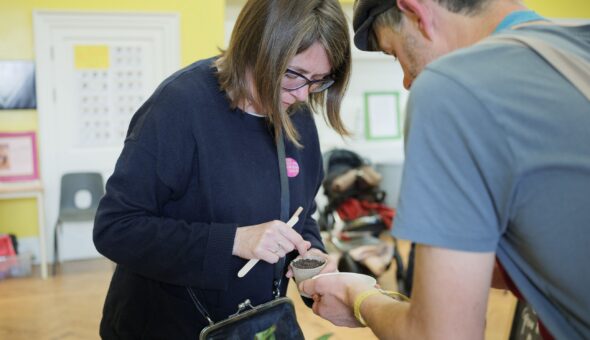Training for public engagement is an essential element in creating a positive culture of public engagement with research, so why is it so difficult?
Training in public engagement
Training and professional development for researchers is one of the critical strands of creating a positive culture of public engagement at universities. However, according to findings from State of Play (2016), there are numerous challenges associated with both providing and participating in training for public engagement. Our experience of providing professional development opportunities at the University of Bath, we think, reflects the national picture, and we wanted to investigate this issue in more detail with ChallengeCPD@Bath (2017-2019) project.
ChallengeCPD@Bath
With funding from UKRI’s Strategic Support to Expedite Embedding Public Engagement with Research call, we developed ChallengeCPD@Bath to investigate the issues around the uptake and impact of training and professional development opportunities.
We wanted to share some of our key learning outcomes, talking points and how we applied those to our training and professional development offer over this blog series, starting with what is the trouble with training?
Training is asked for but not taken up
We, like other public engagement professionals across the sector, have often found an issue around the uptake of our professional development offer. While at the same time despite offering opportunities in response to researchers’ needs, researchers say they aren’t being offered any. Suggesting a mismatch between what is being offered, noticed and taken up by researchers.
Just in time
The most preferred form of training we’ve found appears to be ‘just in time’ training and support, which includes one-one coaching conversations. Often this support for researchers is directly linked to an event or public engagement project and is very well received and valued. We don’t know if these ‘under the radar’ interventions are actually perceived as part of professional development by researchers, and as a result, we suspect they are under-reported in surveys such as the Factors Affecting Public Engagement survey (2016). For us at the Public Engagement Unit, the time involved in this form of support and/or developing new resources for this purpose is a significant demand on our capacity.
The value of training evolves depending on researchers’ engagement experience
Those who are not active engagers are often not aware of the training available because it is not perceived as being relevant. However, they will also then report a lack of formal training as a critical barrier to participation (when asked) as they feel they do not have the right skills and confidence. Meanwhile, those who are more experienced tend to report they have learnt the most from doing public engagement, rather than the training they have participated in. This is not surprising, engagement is a skill that develops with practice—the perceived value of training changes on the degree of public engagement experience of the researcher.
What’s the purpose of training?
For most formal training and professional development, the driving purpose has been to raise awareness of, and increase researchers’ participation in, public engagement. Training to drive an improvement in the quality of public engagement practice is labour intensive for both us and researchers. Few agreed frameworks relate to quality, there is no real steer for the skills, behaviours and attributes that professional development should be supporting. For us, much of our discussion around quality of engagement tends to be informal and responsive once a researcher or department have identified the need to progress their practice further.
Discipline or institution?
For many researchers who seek out professional development opportunities, what the institution is offering may not be the first port of call. It all depends on how closely they identify with their peers in their discipline and professional community or with the institution they are based. Only focusing on the institution culture when a researcher is more closely aligned to their peers will inevitably be a barrier to uptake of training.
The challenge for the Public Engagement Unit
Our strand of work covering professional development has been the most reactive and ad-hoc with the offer changing on an annual basis we think because of some of the issues raised here as well as reflecting the changing needs of researchers. We like to think of our service is responsive to the changing needs of our academic colleagues and agile enough to accommodate them, but these issues present some real problems for our small team.
Where do we prioritise our limited time and resources to support professional development for public engagement? Adapting, or developing new, activities and bespoke support that comes our way takes time and resources. Frequently, when we deliver these sessions, it can be hard to ensure attendance, with many people dropping out at the last minute because of other pressures on their time.
There are also times where we are unable to support these activities due to our limited capacity. This means that researchers are undertaking public engagement while feeling underprepared, creating risks in terms of participant and researcher experience, which can result in non-participation in public engagement in the future.
Any of this sound familiar?
While professional development for public engagement has a crucial role to play in driving culture change we’ve found it could also potentially be stifling it.
Up next on the blog....
In the next blog, we’ll look in a little more detail about the issues of terminology around continuous professional development and what it reveals about the value higher education institutions place on it.
Helen Featherstone is Head of Public Engagement at the University of Bath.
Respond


